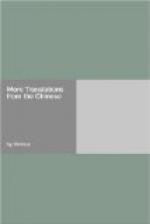“How was I to repel this advance? I would gladly have hidden your letter, but it would have been immoral to harbour a record of illicit proposals. Had I shown it to my mother, I should ill have requited the debt we owe you. Were I to entrust a message of refusal to a servant or concubine, I feared it might not be truly delivered. I thought of writing a letter to tell you what I felt; but I was afraid I might not be able to make you understand. So I sent those trivial verses, that I might be sure of your coming. I have no cause to be ashamed of an irregularity which had no other object but the preservation of my chastity.”
With these words she vanished. Chang remained for a long while petrified with astonishment. At last he climbed back over the wall and went home in despair.
Several nights after this he was lying asleep near the verandah, when some one suddenly woke him. He rose with a startled sigh and found that Hung-niang was there, with bedclothes under her arm and a pillow in her hand. She shook Chang, saying, “She is coming, she is coming. Why are you asleep?” Then she arranged the bedclothes and pillow and went away.
Chang sat up and rubbed his eyes. For a long while he thought he must be dreaming, but he assumed a respectful attitude and waited.
Suddenly Hung-niang came back, bringing her mistress with her. Ts`ui, this time, was languid and flushed, yielding and wanton in her air, as though her strength could scarcely support her limbs. Her former severity had utterly disappeared.
That night was the eighth of the second decade. The crystal beams of the sinking moon twinkled secretly across their bed. Chang, in a strange exaltation, half-believed that a fairy had come to him, and not a child of mortal men.
At last the temple bell sounded, dawn glimmered in the sky and Hung-niang came back to fetch her mistress away. Ts`ui turned on her side with a pretty cry, and followed her maid to the door.
The whole night she had not spoken a word.
Chang rose when it was half-dark, still thinking that perhaps it had been a dream. But when it grew light, he saw her powder on his arm and smelt her perfume in his clothes. A tear she had shed still glittered on the mattress.
For more than ten days afterwards he did not see her again. During this time he began to make a poem called “Meeting a Fairy,” in thirty couplets. It was not yet finished, when he chanced to meet Hung-niang in the road. He asked her to take the poem to Ts`ui.
After this Ts`ui let him come to her, and for a month or more he crept out at dawn and in at dusk, the two of them living together in that western parlour of which I spoke before.
Chang often asked her what her mother thought of him. Ts`ui said, “I know she would not oppose my will. So why should we not get married at once?”
Soon afterwards, Chang had to go to the capital. Before starting, he tenderly informed her of his departure. She did not reproach him, but her face showed pitiable distress. On the night before he started, he was not able to see her.




